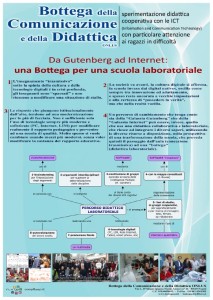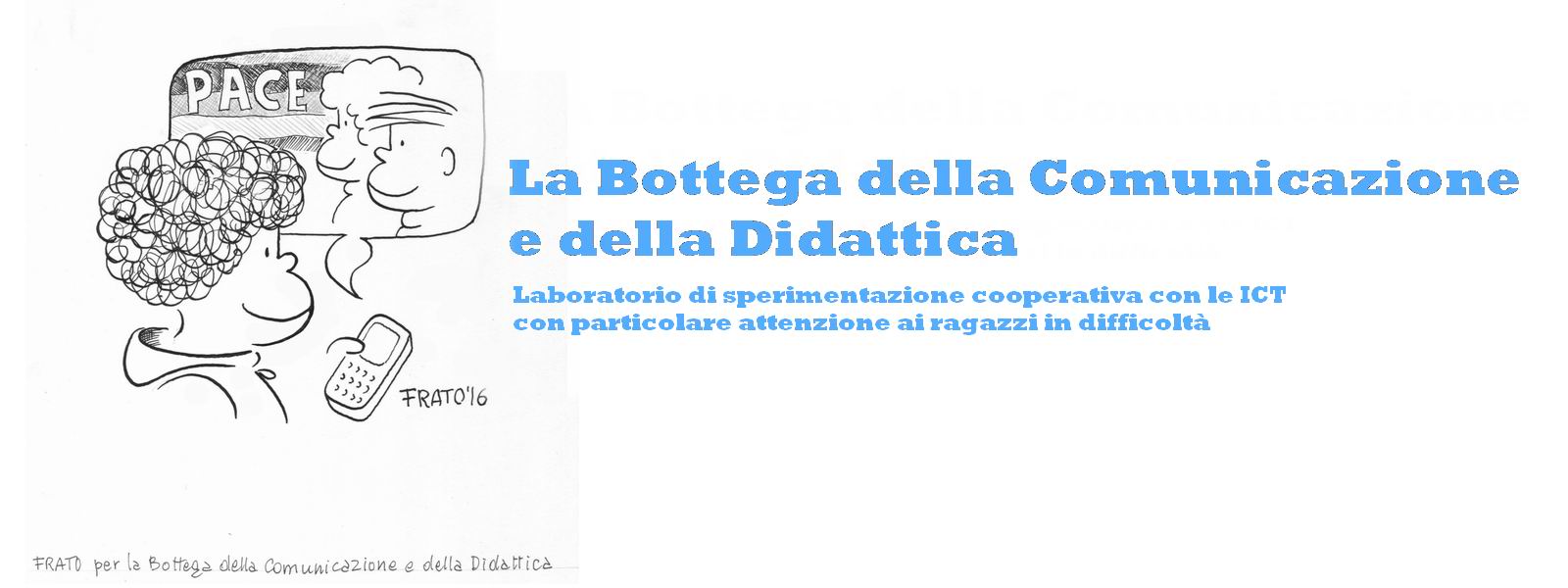A workshop to renew didactics
The school transmissive, on the impetus of digital culture, is in deep crisis. Teachers, left to themselves, they feel lost in contact with digital natives and fail to change, through innovation and adaptation, anchored to traditional often with the certainty of still have The truth.
Institutional responses, tend, Typically, a facade modernization: not just the use of new technologies (PC, LIM, Tablet, etc..) for a quality school and pedagogical relationship; the use of modern media is not a sufficient condition to change the substance of educational relationship, again based on teacher transmits and the child who must only receive. A school that takes account of Gutenberg Galaxy and of the Galaxy Internet uses a collaborative teaching, workshop, that integrates the various knowledge and use the various resources available, in order to pass from a conception of knowledge transmission at a laboratory teaching, permeated by digital culture. For years, communication workshop and teaching, Workshop-project against early school leaving, aims to change how knowledge processing, making teaching/learning more attractive, engaging and satisfying the requirements of the knowledge society at European level; one experiences, referring
- a) pedagogical innovations of the second half of last century:
-popular pedagogy M.C.E., the School of Barbiana of don Lorenzo Milani, the Pedagogy of inclusion by Andrea Canevaro, the The grammar of fantasy Gianni Rodari's fable, the Maieutica and Empowerment by Danilo Dolci, l' Education as the practice of Freedom by Paulo Freire, and many others
- b) and lately developed in research psycho-pedagogical field:
– the Theory of multiple intelligences by H. Gardner on the characteristics of the human mind, the Social constructivism and theMeaningful learning Ausubel, the Knowledge representation with maps by J. Novak.
All, taking into account the digital culture, that is becoming more fully into school.
In the workshop we experience and occurs as a pedagogical model in a context of cooperative learning characterized by ICT, for an alternative to trivial transmissibility of knowledge and custodian of education conception. The methodology, tested with elementary school students[1], Media, higher and university students[2] (In addition to numerous teacher training experiences[3]) is plural:
– It starts with a brainstorming to set the arguments (usually to overcome interdisciplinary disciplines segmentation), to identify conceptual nodes on map (written by PC) projected onto the screen; the teacher helps the students to express themselves to encouraging their participation and take into account the previous knowledge;
– It works by setting up small cooperative groups (each of which is assigned the branch the map that interests) based on Multiple intelligences (taking into account the diversity of the participants ' cognitive styles) identified by the use of special software;
– for research and analysis, In addition to using traditional tools like books, etc.. some PCs connected to the Internet, addressing themes to be developed with search mode and more congenial to individual communication and individual groups are organising the presentation of knowledge with maps (free software) and with advanced technologies (PC, LIM, Internet Network, Tablet, etc);
– the teacher is not a simplest transmitter of knowledge, but a stir of interest, proofreader, Trainer, Definitor-an Illustrator path, starting point for deepening individual and collective, that is new for students.
– the selection of study materials is not intended, but it becomes flexible and customized cognitive paths; students do not only use the codified knowledge text book, but integrate knowledge through a variety of tools and sources: Internet, teacher, film, experts, books, etc.
– the experience ends producing a multimedia and self-assessment of work (product and location).
– The results are interesting for the use of a single methodology at different school levels (including University), and the reproducibility of the experience in different contexts.
-There is a certain resistance to change by some teachers who see so diminished the importance of its role, While it is just the opposite; the teacher takes a task much more challenging and important.
-The Bottega[4] may be a reference to implement a collaborative and inclusive-to exchange with international educational reality, site www.bottegacd.it (about mailing lists 17.000 contacts around the world).
Are similarly experienced workshops with teachers of each order/interdisciplinary degree (to overcome the "outdated" know settorializzato) with the editing/creation of teacher portfolio.

[1] A significant experiment was conducted with a group of disabled children of a primary school
[2] For some years the Workshop methodology was used in Media Laboratory and psychological development the Faculty of communication sciences of the University of Cassino (FR), Polo didattico di Sora.
[3] In the project To WeBottega for the Peace We hosted Palestinian teachers, Israelis and Neapolitans in dialogues, laboratories, educational guidelines for a discussion on their experiences, aimed at promoting inclusion, participation and coexistence between different cultures.
[4] The shop has recently established as an association in order to more easily manipulate the territory with its own methodology
